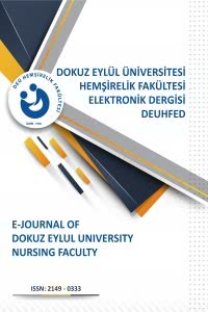Doğum Destekçilerinin Doğum Eylemine Katılma Konusundaki Görüşleri ve Gereksinimleri
Doğum, Doğum Eylemi, Doğum Destekçisi, Görüş, Gereksinim
Opinions and Requirements of Companionship to Support on Labour
Labour, Birth Companionship, Requirement in Labour.,
___
- Aksayan, S., Emiroğlu, N.(2002). Araştırma tasarımı, Hemşirelikte araştırma ilke süreç ve yöntemleri. (1. Baskı, sy. 78., pp. 65–124). İstanbul: Odak Ofset.
- Banda, G., Kafulafula, G., Nyirenda, E., Taulo., F., Kalilani, L.(2010). Acceptability and experience of supportive companionship during childbirth in Malawi. BJOG: An
- International Journal of Obstetrics and Gynaecology,117(8),937–45.Başkale, H.(2016). Nitel araştırmalarda geçerlik, güvenirlik ve örneklem büyüklüğünün belirlenmesi. Dokuz Eylül Üniversitesi Hemşirelik Fakültesi Elektronik Dergisi, 9(1).
- Bohren, M.A., Hunter, E.C., Munthe-Kaas, H.M., Souza, J.P., Vogel, J.P., Gülmezoglu, A.M.(2014). Facilitators and barriers to facility-based delivery in low- and middle-income countries: a qualitative evidence synthesis. Reprod Health,11(1),71.
- Bohren, M.A., Munthe-Kaas, H., Berger, B.O., Allanson, E.E., Tunçalp, Ö.(2016). Perceptions and experiences of labour companionship: a qualitative evidence synthesis. Cochrane Database Syst Rev,(12),CD012449.
- Bohren, M.A., Hofmeyr, G.J., Sakala, C., Fukuzawa, R.K., Cuthbert, A.(2017). Continuous support for women during childbirth. Cochrane Database Syst Rev,(7),CD003766.
- Bruggemann, O.M., Parpinelli, M.A., Osis, M.J., Cecatti, J.G., Neto, A.S.C.(2007). Support to woman by a companion of her choice during childbirth: a randomized controlled trial. Reproductive Health, 4(1),5.
- ICM (2014). (Erişim: 17 Nisan 2018). http://internationalmidwives.org/assets/uploads/documents/CoreDocuments/CD2005_001%20V2014%20ENG%20Philosophy%20and%20model%20of%20midwifery%20care.pdf.
- ICM, (2010). Essential competencies for basic midwifery Practice. (Erişim: 20 Nisan 2018). https://internationalmidwives.org/assets/uploads/documents/CoreDocuments/ENG%20Definition_of_the_Midwife%202017.pdf.
- ICM (2017). (Erişim: 17 Nisan 2018). https://internationalmidwives.org/assets/uploads/documents/CoreDocuments/ENG%20Definition_of_the_Midwife%202017.pdf.Karaçam, Z., Akyüz, E.Ö.(2011). Doğum eyleminde verilen destekleyici bakım ve ebe/hemşirenin rolü. Florence Nightingale Hemşirelik Dergisi, 19(1),45-53.
- Lazzaretto, E., Nespoli, A., Fumagalli, S., Colciago, E., Perego, S., Locatelli, A.(2018). Intrapartum care quality indicators: a literature review. Minerva Ginecologica, 70(3), 346-56.
- Miltner, R.S.(2000). Identifying labor support actions of intrapartum nurses. JOGNN, 29(5), 491–499.
- Munoz, E.G., Collins, M.(2015). Establishing a volunteer doula program within a nurse-midwifery education program: a winning situation for both clients and students. J Midwifery Womens Health, 60, 274–7.
- Nilsson, C., Lundgren, I. (2009).Women’s lived experience of fear of childbirth. Midwifery, 25, 1–9.
- Sağlık Bakanlığı, Anne Dostu Hastane Programı (2012). (Erişim: 17 Nisan 2018). http://hsgm.saglik.gov.tr/kadinureme/ -Anne-Dostu-Hastane-Program.
- Sağlık Bakanlığı, Sağlıkta Kalite Standartları (SKS) (2016). Güvenli Doğum Kontrol Listesi (Erişim: 17 Nisan 2018). https://dosyamerkez.saglik.gov.tr/Eklenti/3460,skshastanesetiv5r1pdf.pdf?0.
- Sağlık Meslek Mensupları ile Sağlık Hizmetlerinde Çalışan Diğer Meslek Mensuplarının İş ve Görev Tanımlarına Dair Yönetmelik (2014). (Erişim: 08 Mart 2018). http://www.resmigazete.gov.tr/eskiler/2014/05/20140522-14.htm.
- Shakibazadeh, E., Namadian, M., Bohren, M.A., Vogel, J.P., Rashidian, A., Pileggi, V.N.(2018). Respectful care during childbirth in health facilities globally: a qualitative evidence synthesis. BJOG: An International Journal of Obstetrics & Gynaecology, 125(8), 932-942.
- Sleutel, R.M.(2003). Intrapartum nursing: Integrating Rubin’s framework with social support theory. JOGNN,32(1),76–82.
- World Health Organization (2015). (Erişim: 08 Nisan 2018). http://apps.who.int/iris/handle/10665/199177.
- World Health Organization (2015).Recommendations on health promotion interventions for maternal and newborn health. Geneva: World Health Organization; (Erişim: 17 Temmuz 2018).http://apps.who.int/iris/bitstream/10665/172427/1/9789241508742_report_eng.pdf
- World Health Organization, (2018). Intrapartum care for a positive childbirth experience.
- World Health Organization (2003).Managing Newborn Problems: A guide for doctors, nurses, and midwives. Geneva
- World Health Organization (2005). Pocket book of hospital care for children: guidelines for the management of common illnesses with limited resources. Geneva.
- World Health Organization (2012). Guidelines on basic newborn resuscitation. Geneva
- World Health Organization (2015). Pregnancy, Childbirth, Postpartum and Newborn Care: A guide for essential practice. Geneva
- Zar, M., Wijma, K., Wijma, B.(2001). Pre- and postpartum fear of childbirth in nulliparous and parous women. Scandinavian Journal of Behaviour Therapy, 30,75–84.
- ISSN: 2149-0333
- Yayın Aralığı: Yılda 4 Sayı
- Başlangıç: 2008
- Yayıncı: Dokuz Eylül Üniversitesi Hemşirelik Fakültesi
Meslek Hastalığının Boyutları ve Meslek Hastalıklarından Korunmada İş Sağlığı Hemşiresinin Rolleri
Akgün YEŞİLTEPE, Gülendam KARADAĞ
Doğum Destekçilerinin Doğum Eylemine Destek Konusundaki Görüşleri ve Gereksinimleri
Doğum Destekçilerinin Doğum Eylemine Katılma Konusundaki Görüşleri ve Gereksinimleri
Hemşirelik Öğrencilerinin Bakım Planlarının Pediyatrik Ağrı Yönetimi Açısından İncelenmesi
ŞERİFE TUTAR GÜVEN, AYLA KAYA, AYŞEGÜL İŞLER DALGIÇ
Spiritüel Bakım Gereksinimleri Ölçeği Türkçe Formunun Geçerlik ve Güvenirliği
Ahmet EROL, Ayten ZAYBAK, Handan ÖZDEMİR, Elif GÜNAY İSMAİLOĞLU
Üniversitede Çalışan Kadınların Meme Kanserı̇nde Erken Tanıya Yönelı̇k Sağlık İnançları
Hemşirelik Doktora Öğrencilerinin Araştırma Etiği Hakkındaki Görüşlerinin İncelenmesi
